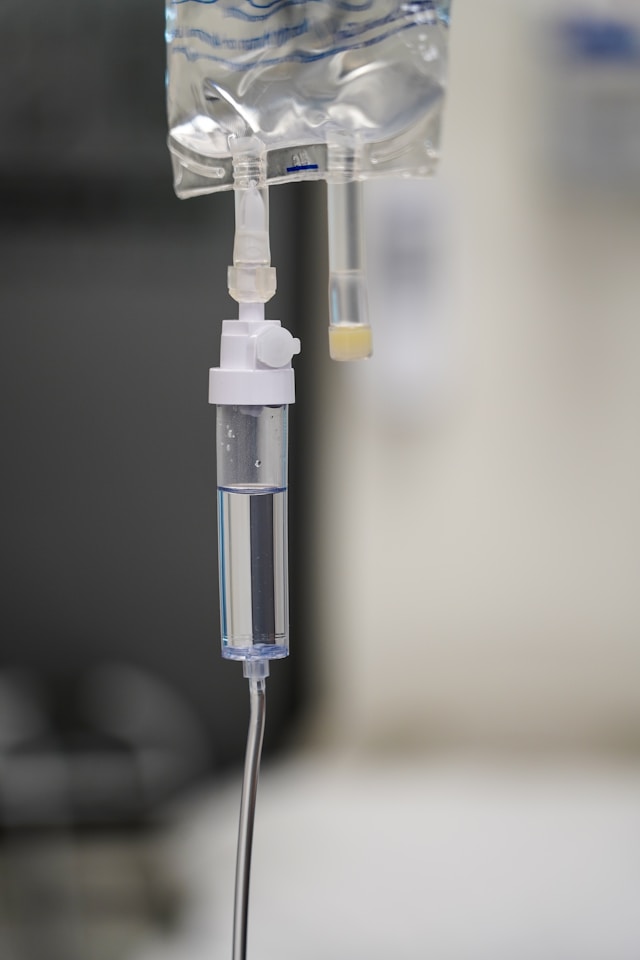
The Role of Specialty Nurses in Infusion Therapy


Dr. Chen is a board-certified immunologist with over 15 years of experience treating autoimmune and immunodeficiency disorders. She specializes in IVIG therapy and has published extensively on immune system treatments.
Medical Disclaimer
Behind every successful infusion therapy experience is a skilled infusion nurse who ensures your treatment is safe, comfortable, and effective. These specialized healthcare professionals combine advanced nursing knowledge with expertise in IV therapy, medication administration, and patient care. Understanding the critical role infusion nurses play helps you appreciate the comprehensive support you receive during treatment and the expertise guiding your care.
Key Highlights
- Infusion nurses are registered nurses with specialized training and often certification in IV therapy, vascular access, and infusion medication administration.
- They manage every aspect of your infusion experience—from IV placement and medication administration to monitoring for reactions and providing patient education.
- Many infusion nurses hold CRNI (Certified Registered Nurse Infusion) certification, demonstrating advanced expertise in infusion therapy nursing practice.
What Are Infusion Nurses
Infusion nurses are registered nurses (RNs) who specialize in administering medications, fluids, and blood products through intravenous, subcutaneous, and other routes. While all RNs receive basic IV therapy training, infusion nurses develop deep expertise specifically in infusion practices through additional education, specialized training, and focused experience.
Many infusion nurses work exclusively in infusion centers, hospital infusion departments, or home infusion agencies, dedicating their entire practice to infusion therapy. This focused experience allows them to develop exceptional skills in vascular access, infusion medication knowledge, and recognizing and managing complications.
According to the Infusion Nurses Society, infusion therapy represents a distinct nursing specialty requiring specialized knowledge and skills beyond general nursing practice.
Education and Certification
Basic Qualifications: All infusion nurses are licensed registered nurses (RNs), having completed either an Associate Degree in Nursing (ADN) or Bachelor of Science in Nursing (BSN), passed the NCLEX-RN licensing examination, and obtained state nursing licensure.
Specialized Training: Beyond basic nursing education, infusion nurses receive additional training in IV therapy techniques, vascular access devices, infusion medications and their complications, infection prevention in infusion therapy, and management of infusion reactions and emergencies.
CRNI Certification: Many experienced infusion nurses pursue Certified Registered Nurse Infusion (CRNI) certification through the Infusion Nurses Certification Corporation. This credential requires:
- Current RN licensure
- Minimum hours of infusion nursing practice
- Passing a comprehensive examination covering infusion therapy standards and practices
- Ongoing continuing education to maintain certification
CRNI certification demonstrates advanced expertise and commitment to excellence in infusion nursing practice.
Continuing Education: Infusion nurses participate in regular continuing education about new medications, updated infusion protocols, emerging best practices, and evolving safety standards. They receive medication-specific training for each biologic or specialty medication they administer.
Key Responsibilities of Infusion Nurses
Patient Assessment: Before each infusion, nurses assess your overall condition, review medical history, check vital signs, evaluate current symptoms, review medications and allergies, and identify any changes since your last visit that might affect treatment.
Vascular Access: Infusion nurses are experts at IV placement, including selecting appropriate veins and insertion sites, using proper sterile technique, securing catheters to prevent dislodgement, and assessing for complications like infiltration or phlebitis. Experienced infusion nurses develop remarkable skill at accessing difficult veins, often succeeding where others have struggled.
Medication Preparation and Administration: Nurses verify medication orders, perform multiple safety checks (right patient, right drug, right dose, right route, right time), prepare medications following aseptic technique, program infusion pumps accurately, and administer medications according to specific protocols.
Monitoring During Infusion: Throughout your treatment, infusion nurses continuously monitor for infusion reactions, check vital signs at prescribed intervals, assess IV site function, evaluate your comfort and symptoms, and adjust infusion rates as appropriate or necessary.
Managing Complications: When issues arise, infusion nurses respond quickly to stop or slow infusions if reactions occur, administer medications to manage reactions (antihistamines, corticosteroids, epinephrine if needed), provide supportive care, notify physicians when necessary, and document incidents thoroughly.
Patient Education: Infusion nurses teach patients about their medications, explain what to expect during and after infusions, discuss potential side effects and when to report them, provide self-care instructions, and answer questions about treatment.
Documentation: Comprehensive documentation of pre-infusion assessments, medication administration details, vital signs and monitoring, any reactions or complications, patient responses and education, and post-infusion condition ensures continuity of care and safety.
Collaboration: Infusion nurses work closely with physicians who prescribe treatment, pharmacists who prepare medications, other nurses managing patient care, insurance coordinators, and the entire healthcare team supporting your treatment.
Specialized Skills Infusion Nurses Develop
Advanced Vascular Access: Exceptional IV placement skills, including ability to access small or difficult veins, experience with various catheter types and sizes, knowledge of optimal site selection, and expertise with ultrasound-guided IV placement if needed.
Medication Expertise: Deep knowledge of hundreds of infusion medications, including mechanisms of action and expected effects, potential reactions and side effects, appropriate administration rates and protocols, drug interactions and contraindications, and specific monitoring requirements for each medication.
Reaction Recognition: Ability to quickly identify infusion reactions and adverse effects, distinguish between minor discomfort and serious complications, assess severity and appropriate response, and remain calm and effective during emergencies.
Patient Advocacy: Infusion nurses advocate for patients by communicating concerns to physicians, helping patients understand their treatment options, connecting patients with financial assistance resources, and ensuring patient comfort and dignity during treatment.
Relationship Building: Many infusion nurses see the same patients repeatedly over months or years, building therapeutic relationships that enhance care. They remember individual preferences, anticipate specific needs, provide emotional support, and celebrate treatment successes.
According to the American Nurses Association, the therapeutic nurse-patient relationship is fundamental to quality nursing care, particularly in ongoing treatment like infusion therapy.
A Day in the Life of an Infusion Nurse
Infusion nurses' days are demanding but rewarding:
Morning Preparation: Reviewing the day's schedule, verifying medication orders and deliveries, preparing treatment rooms, ensuring equipment functionality, and coordinating with the pharmacy.
Patient Care: Throughout the day, infusion nurses typically care for multiple patients simultaneously at various stages of treatment. They must efficiently manage multiple infusions at different stages, respond promptly to patient needs and call bells, handle unexpected complications or reactions, maintain thorough documentation, and coordinate patient flow and scheduling.
Problem Solving: Infusion nursing requires constant critical thinking—troubleshooting IV access issues, managing reactions quickly and effectively, adjusting plans when complications arise, communicating with physicians about concerns, and ensuring smooth patient transitions.
Emotional Support: Beyond technical skills, infusion nurses provide crucial emotional support to patients who may be anxious, dealing with chronic illness challenges, experiencing treatment side effects, or facing uncertain prognoses.
End-of-Day Responsibilities: Completing documentation, communicating with oncoming shift nurses, restocking supplies, and preparing for the next day.
Why Infusion Nurses Matter
Safety: Proper infusion technique, vigilant monitoring, and quick reaction recognition prevent complications and ensure safe medication administration. Infusion nurses' expertise is the primary safeguard protecting patients during treatment.
Comfort: Skilled IV placement minimizes discomfort. Attentive care during infusions addresses needs promptly. Compassionate communication reduces anxiety and makes hours-long treatments more bearable.
Efficacy: Correct medication administration according to precise protocols ensures you receive full therapeutic benefit. Proper management of side effects allows treatment completion without unnecessary interruptions.
Continuity: Seeing familiar nurses who know your history, preferences, and responses to treatment provides continuity that enhances care quality.
Education: Patient education from knowledgeable infusion nurses empowers you to participate actively in your care, recognize concerning symptoms, and manage between appointments.
Advocacy: Infusion nurses often identify issues—insurance barriers, medication access problems, inadequate symptom control—and advocate for solutions.
What Patients Appreciate About Infusion Nurses
Patients consistently highlight these qualities in exceptional infusion nurses:
Technical Expertise: "Getting my IV on the first try" and handling difficult veins with skill. Confidence and competence in medication administration. Knowledge about medications and ability to answer questions.
Compassion and Caring: Genuine kindness and empathy. Treating patients with dignity and respect. Remembering personal details and asking about patients' lives beyond their illness.
Communication: Explaining what's happening during treatment. Listening to concerns without dismissing them. Providing clear instructions about post-infusion care.
Responsiveness: Promptly answering call bells. Checking in proactively rather than waiting to be called. Quickly addressing discomfort or concerns.
Creating Comfort: Making long infusions more bearable through conversation, adjusting room temperature, providing blankets and pillows, and attending to small details that enhance comfort.
Infusion Nursing Challenges
While rewarding, infusion nursing presents challenges:
Physical Demands: Long hours on feet, repetitive tasks (IV placement, medication preparation), managing multiple patients simultaneously, and physically assisting patients when needed.
Emotional Labor: Caring for patients with serious chronic illnesses, supporting anxious or distressed patients, maintaining professionalism during difficult situations, and managing personal emotional responses.
High-Stakes Environment: Administering powerful medications with serious potential complications, maintaining vigilance throughout long shifts, responding quickly and correctly during emergencies, and bearing responsibility for patient safety.
Complex Patients: Managing patients with difficult vascular access, coordinating care for complex medical histories, addressing patients' financial and insurance concerns, and navigating challenging interpersonal dynamics.
Despite these challenges, most infusion nurses find their work deeply meaningful and remain in the specialty for years or decades.
How to Support Your Infusion Nurses
Arrive Prepared: Come well-hydrated, having eaten appropriately, with your medication list and insurance card ready. This helps appointments run smoothly.
Communicate Openly: Share information about previous IV experiences, allergies, current symptoms, or concerns. Nurses can't read minds—your input helps them provide better care.
Be Patient: Infusion centers can be busy. If your nurse seems hurried, understand they're likely managing multiple patients. They'll attend to your needs as quickly as possible.
Follow Instructions: Take prescribed pre-medications as directed. Inform nurses immediately if you experience symptoms during infusion. Follow post-infusion care instructions.
Express Appreciation: A simple "thank you" means a lot. Specific feedback about what nurses do well encourages them and may be shared with supervisors.
Provide Feedback: Both positive comments and constructive concerns help infusion centers improve. Most facilities welcome patient feedback.
Frequently Asked Questions
What qualifications do infusion nurses have?
Infusion nurses are licensed registered nurses (RNs) who have completed nursing education (ADN or BSN), passed the NCLEX-RN licensing exam, and obtained state licensure. Beyond basic nursing credentials, infusion nurses receive specialized training in IV therapy, infusion medications, and vascular access. Many pursue CRNI (Certified Registered Nurse Infusion) certification, demonstrating advanced expertise through examination and continuing education. Infusion nurses also receive medication-specific training for each drug they administer.
How experienced are infusion nurses with IV placement?
Infusion nurses typically have extensive IV placement experience, often placing dozens of IVs weekly for years. Many have placed thousands of IVs throughout their careers. This focused practice develops exceptional skill at accessing difficult veins, selecting optimal sites, and using techniques that minimize discomfort. If you have challenging venous access, experienced infusion nurses often succeed where others have struggled. Don't hesitate to request your most experienced nurse if IV placement has been difficult in the past.
Can I request the same infusion nurse each time?
Many infusion centers try to accommodate continuity requests when scheduling permits. Having the same nurse builds rapport, allows them to learn your preferences and vein characteristics, and creates therapeutic relationships that enhance care. However, nurse schedules, patient volumes, and nurse assignments mean you may not always see the same nurse. Most infusion centers have multiple excellent nurses, so you'll receive quality care regardless of who's assigned to you.
What should I do if I'm not comfortable with my infusion nurse?
If you have concerns about your nurse's competence or conduct, speak with the charge nurse or infusion center manager. Patient safety and comfort are priorities, and good facilities take concerns seriously. Issues might include: multiple unsuccessful IV attempts, dismissing your concerns, not following safety protocols, or unprofessional behavior. Most concerns can be addressed, though personality conflicts occasionally occur and can usually be resolved through communication or assignment changes.
How can I make my infusion nurse's job easier?
Arrive well-hydrated (makes veins easier to access), bring your medication list and insurance card, inform them about any changes in your condition, communicate clearly about discomfort or concerns, follow pre-infusion instructions about eating and pre-medications, be patient if they're busy with other patients, and express appreciation for their care. Cooperative, communicative patients make nurses' challenging jobs more manageable and satisfying.
The Heart of Your Infusion Experience
While medications and medical technology are essential to infusion therapy, infusion nurses are the heart of your treatment experience. Their expertise, compassion, and dedication ensure you receive safe, effective, comfortable care during every appointment.
The therapeutic relationships many patients develop with their infusion nurses provide not just medical care but emotional support, encouragement, and human connection during challenging health journeys. For many patients, their infusion nurse becomes a trusted healthcare partner they see more regularly than their physician.
Ready to experience exceptional infusion nursing care? Find infusion centers near you staffed by skilled, compassionate infusion nurses dedicated to supporting your treatment journey.
Medical Disclaimer: This content is for educational purposes only and is not a substitute for professional medical advice, diagnosis, or treatment. Always consult your healthcare provider with questions about your medical condition or treatment options.
Article Statistics


Table of Contents
Article Statistics










